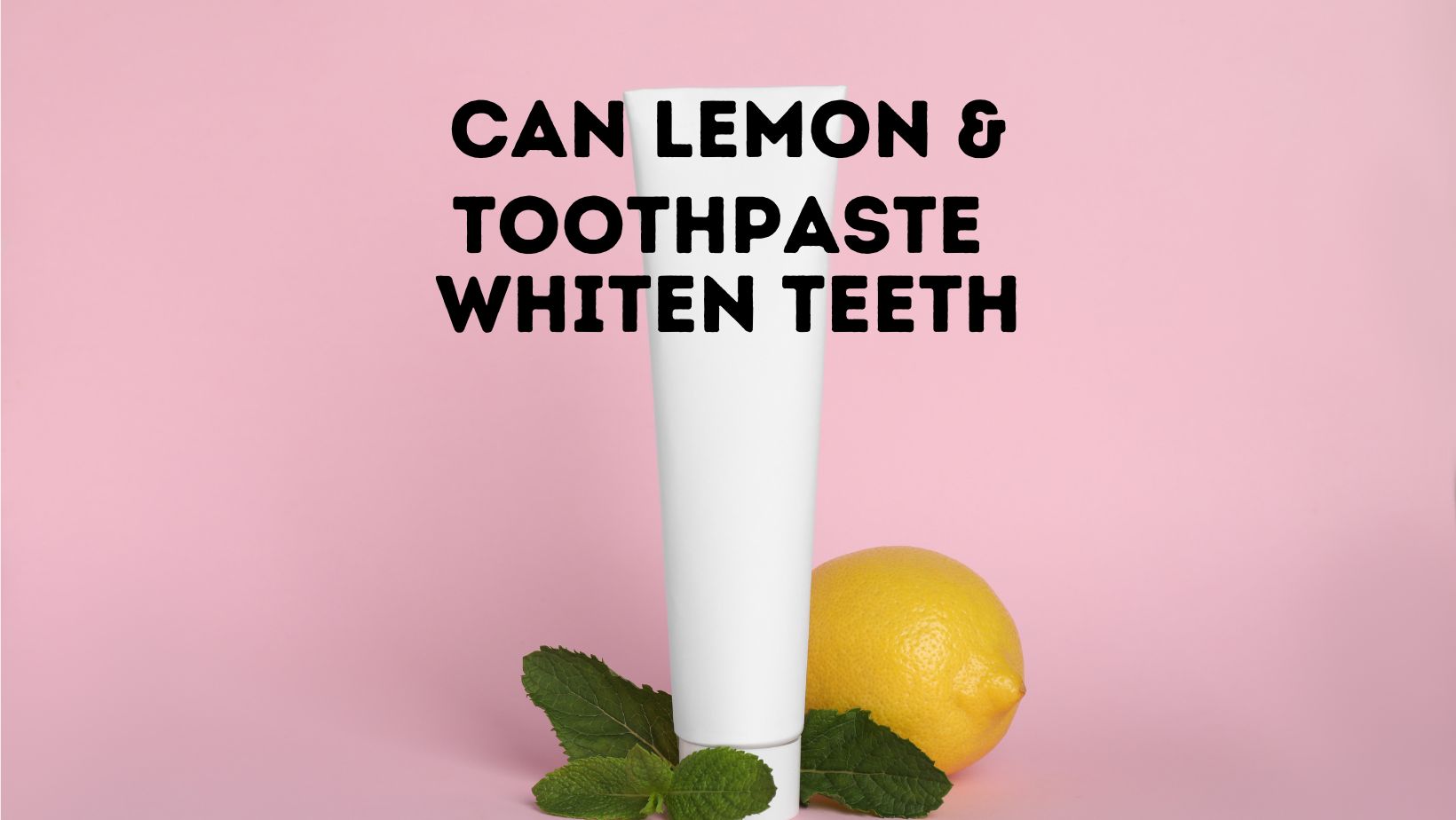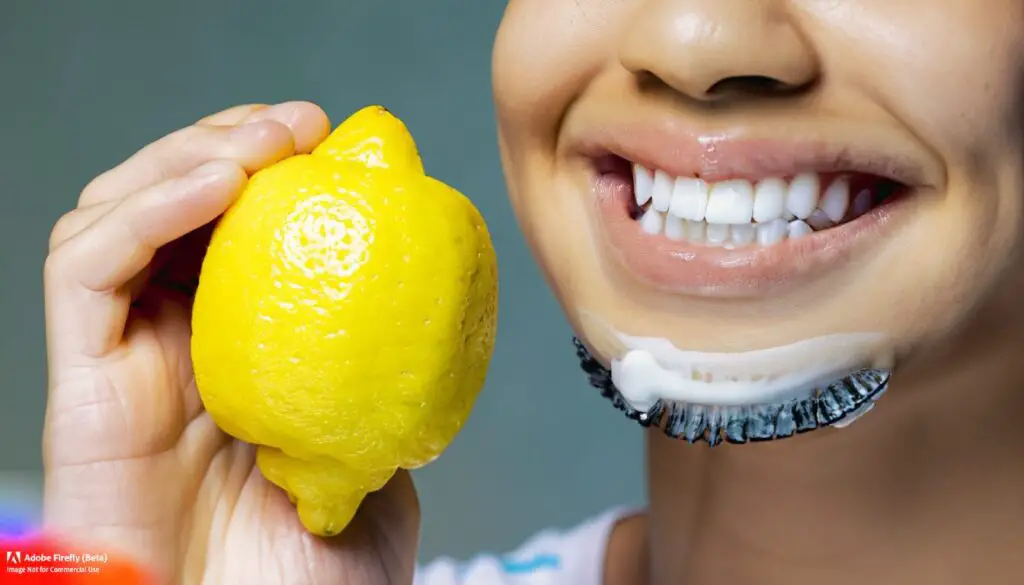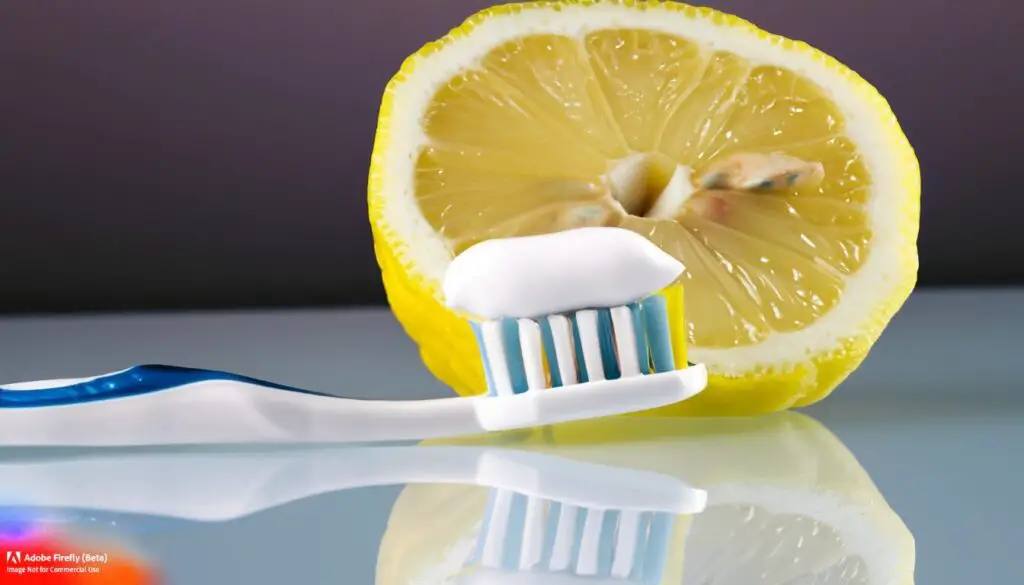
Having white and shiny teeth is undoubtedly a goal for many. Achieving a dazzling smile, however, can be slightly tricky. People try different toothpaste, home remedies, and combinations to attain sparkling white teeth. While some products and tricks help, others are pure myths. The one we will discover today is the Lemon and Toothpaste combination. Can Lemon and Toothpaste whiten teeth? Come, let’s find out.
With its natural acidity and toothpaste formulated specifically for oral hygiene, Lemon seems like a promising duo for brightening teeth. However, before diving into this popular DIY approach, it’s crucial to understand the science behind teeth discoloration and the potential risks involved.
Join us in this article as we explore the effectiveness of lemon and toothpaste as teeth-whitening agents. We will examine the pros and cons so that our readers can make an informed decision.
Table of Contents
How does tooth discoloration occur?
Tooth discoloration can occur due to various factors, including extrinsic (external) and intrinsic (internal). Here’s more about the same.
Extrinsic or External tooth discoloration affects the outer layer of the tooth (enamel). It is often caused by external factors like eating/ drinking dark-colored food and beverages, using tobacco, and following poor oral hygiene. In contrast, Intrinsic or Internal tooth discoloration affects the tooth structure. It can commonly occur by tooth trauma like injuries or accidents; enamel wears down due to age, and certain medications. As enamel naturally wears down, it reveals the underlying dentin, which is naturally yellower.
Tooth discoloration can be a result of both extrinsic and intrinsic factors.
How to use Lemon and Toothpaste for Whitening Teeth effectively
Using a combination of lemon and toothpaste for teeth whitening should be done with caution. Since lemon is acidic, it involves potential risks.
However, if you still want to try this method, here’s how you can do that:
- First, prepare a fresh lemon juice and toothpaste mixture in a small bowl. Take an equal amount of lemon juice and toothpaste (say one teaspoon each) and mix them well together.
- Now wet your toothbrush, dip it into the lemon and toothpaste mixture, and brush gently. Make sure you focus on areas with visible stains or discoloration. However, do not scrub too vigorously, or you may damage the enamel.
- Once done with brushing, rinse your mouth thoroughly. Ensure all the lemon is washed out since minimizing the acid’s contact with your teeth and gums is important.
- While the above teeth whitening DIY can be effective for some, do not overuse the method. Limit the use of lemon on your teeth to once a week or in 10 days. Also, consult a dental professional before attempting DIY teeth whitening methods. They will evaluate your oral health and advise if the DIY is safe for you.

Does lemon juice have natural Whitening effects on Teeth?
Lemon juice is acidic, and due to its citric acid content, it is believed to have natural whitening effects on teeth. If claims are believed, lemon juice can break down stains and brighten the appearance of teeth. However, it’s essential to approach this claim with caution.
While lemon juice is acidic and has bleaching properties, it isn’t the safest to use regularly on the skin and teeth. Due to its highly acidic nature, lemon juice can, over time, erode the protective enamel layer of the teeth. And as enamel starts to wear down, it gives birth to tooth sensitivity and makes them prone to damage and cavities.
In addition, some research suggests that the bleaching effects of lemon juice are minimal compared to professional teeth-whitening products meant for dental use. While lemon juice may address extrinsic tooth discoloration to some level, it cannot help with intrinsic stains that originate from within the tooth structure.
While using lemon juice for teeth whitening, it is generally recommended to exercise caution. Using this DIY once in a while is safe and won’t do any harm; however, including it in a regular oral care routine isn’t recommended.
Understanding toothpaste and its role in Teeth Whitening
Toothpaste is among the most important product for maintaining oral and dental hygiene. However, not all toothpaste is formulated equally regarding teeth whitening. The marketplace has some toothpaste variants available that, as per claims, can whiten teeth. Here’s some light on toothpaste and its role in teeth whitening.
Basic toothpaste functions: Toothpaste removes plaque and prevents tooth decay and gum disease. Traditional toothpaste formulas often include hydrated silica or calcium carbonate as mild abrasives. These ingredients remove surface stains and polish the teeth.
Whereas Whitening toothpaste formulations are different. Toothpaste sold as whitening products are variants that aim to go beyond basic cleaning. Besides mild abrasives, they include other stain-removal ingredients as well. Whitening toothpaste includes ingredients like Hydrogen peroxide that lighten and remove surface stains on the enamel. Or, Baking soda which scrubs away stains and aids in a whiter appearance. Some whitening toothpaste also contains enzymes or papain that break down protein-based stains on the teeth.
However, it is important to learn that whitening toothpaste has its limitations. Products like these may only provide subtle improvements in teeth color. They are usually effective in addressing extrinsic stains caused by external factors. Whitening toothpaste most of the time isn’t effective on intrinsic stains.

Potential risks and drawbacks of using lemon and toothpaste.
While using a combination of lemon and toothpaste for teeth whitening may seem like a convenient DIY option, be aware of the risks involved. For instance:
- Since lemon juice is highly acidic, using it for a long can erode the protective enamel layer of the teeth. Enamel erosion can increase discoloration, tooth sensitivity, and cavity risks.
- As lemon juice increases tooth sensitivity, it makes your teeth uncomfortable when exposed to hot or cold temperatures.
- Lemon juice is highly acidic and thus harsh on the delicate gum tissue. It may result in gum irritation, inflammation, or even chemical burns.
- While it may seem promising, lemon and toothpaste DIY may have limited effectiveness in removing deep or intrinsic stains. Such stains require professional dental treatment.
- Individuals with dental complications like cavities, enamel erosion, or gum disease can experience worsened conditions after using a lemon and toothpaste mixture.
6 Alternatives to lemon and toothpaste for teeth whitening
There are several alternatives to using lemon and toothpaste for teeth whitening, ranging from professional treatments to at-home remedies. Here are some product-based methods and DIY options:
- Professional teeth whitening: Consult a dentist for professional teeth whitening treatments. They may offer options like in-office whitening using hydrogen peroxide or carbamide peroxide gels, laser whitening, or custom-fit whitening trays with professional-grade whitening gel.
- Whitening strips or trays: Over-the-counter whitening strips or trays contain peroxide-based gels and can effectively reduce surface stains. Follow the instructions carefully to achieve optimal results.
- Whitening toothpaste: Look for toothpaste specifically formulated for teeth whitening. These toothpaste variants typically contain mild abrasives and additional ingredients to help remove surface stains. However, they may have limited effectiveness on deep stains.
- Baking soda paste: Mix baking soda with a small amount of water to form a thick consistency. Gently brush your teeth with this paste for a minute or two and rinse thoroughly. Baking soda acts as a mild abrasive and can help remove surface stains.
- Hydrogen peroxide rinse: Dilute hydrogen peroxide with equal water and use it as a mouth rinse. Swish the solution around your mouth for a minute or two and spit it out. Hydrogen peroxide has whitening properties, but be cautious not to swallow it.
- Oil pulling: Swishing a tablespoon of coconut or sesame oil in your mouth for 15-20 minutes to remove plaque and surface stains. However, evidence supporting its teeth-whitening benefits is limited.
Bottom Line…
Overall, lemon and toothpaste may have some whitening properties, but instead of using such DIYs, use a whitening toothpaste. And even before that, consult a dentist to learn why your tooth discoloration is. Instead of following a DIY blindly, it is important to seek professional advice that can give you benefits without doing much harm.

Hi, This is Lyn, I suffer from dental sensitivity for a very long time. PowerToothpaste.com is where I share my views of various toothpaste brands, along with tips on how to use toothpaste and what to look for when purchasing.
